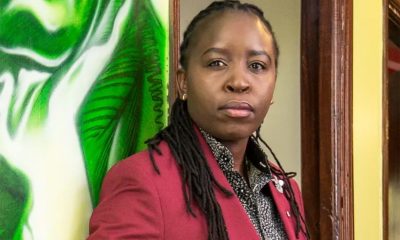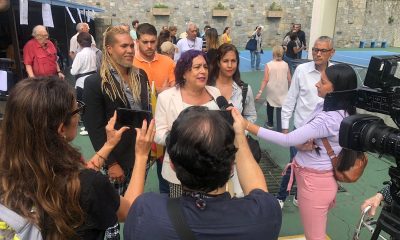South America
Lima Pride march participants send message to Peruvians
More than 50,000 marchers demanded equal rights
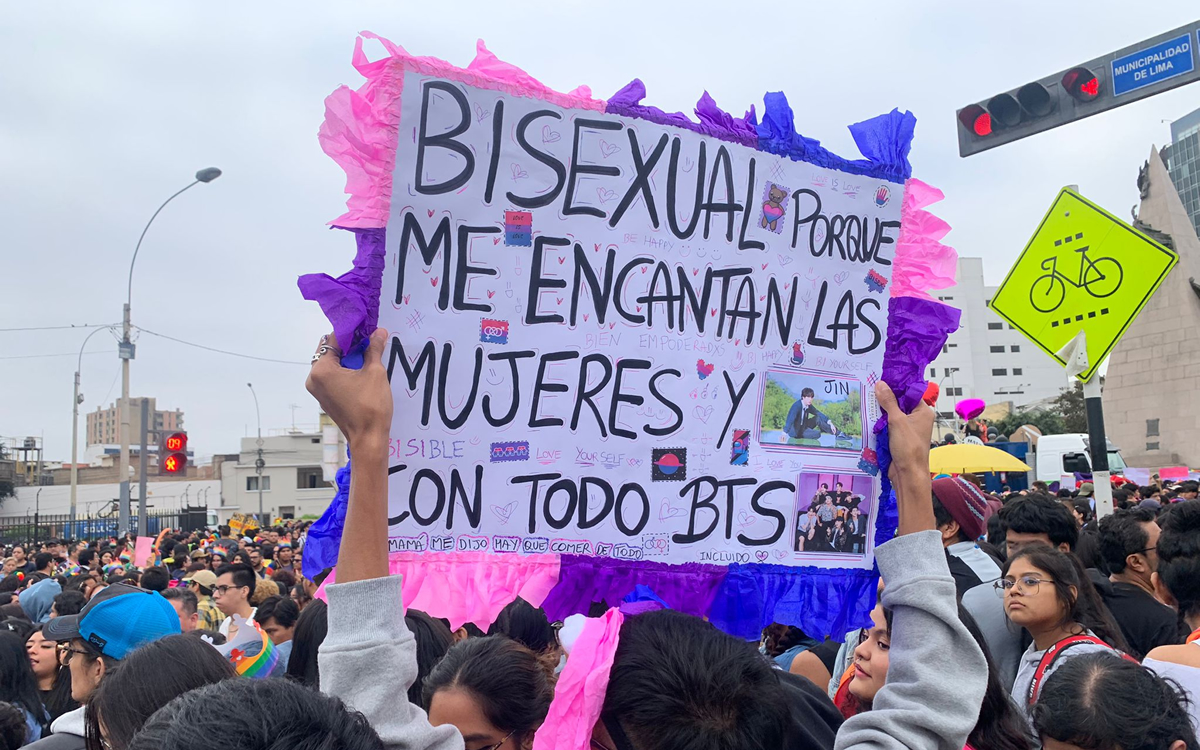
LIMA, Peru — Not even the gray skies of Lima could dim the vibrant festivities of the Pride march in Peru’s capital on July 1.
This year marked Lima’s 21st annual Pride parade and organizers told the Washington Blade it was the biggest yet. More than 50,000 Peruvians marched through the historic streets of the city center dancing with drums, flags and posters. But for some at the march, Pride this year took on a different tone.
The theme of this year’s march was “Pride is Democracy.” A huge screen on the stage at the center of the Pride festivities had a message which said: “Pride is democracy: For a true democracy with social justice and representation.”
With this theme in mind, most of the people who spoke to the Blade talked about the state of LGBTQ and intersex rights in Peru and their fight to maintain and improve Peru’s democracy.
“This year, more than eight trans women have been murdered in a truly ruthless way,” said Leila Heurta, the director and founder of Feminas Peru, an NGO dedicated to the empowerment of transgender women. “And that is why we can’t forget the political side of the march. That’s why the motto of this year’s march is: without pride, there is no democracy.”
While Peru is a democracy, it is one of the few countries on the continent that offers zero legal recognition for same-sex couples. Further, as many of the marchers pointed out, police often fail to investigate the deaths of murdered trans women or arrest the culprits.
Jorge Apolaya, one of the organizers of this year’s march, told the Blade he believes Peru’s democracy is backsliding.
“[This year’s march] takes place in a year in which we feel that there are more and more setbacks regarding the political situation of the country,” said Apolaya. “Our democracy is getting weaker and weaker. It is very important for us that we can live in a democracy, because only in a democracy can we demand respect for the human rights of LGBT people.”
Despite the lack of rights and legal protections for LGBTQ and intersex people in Peru, many marchers seemed optimistic about their future.
Steve Arnao, a 36-year-old doctor, attended the march with his boyfriend.
“I see a change that is slowly taking place in Peru,” he told the Blade. “But it is important that each year, we join the march and continue fighting for our rights.”
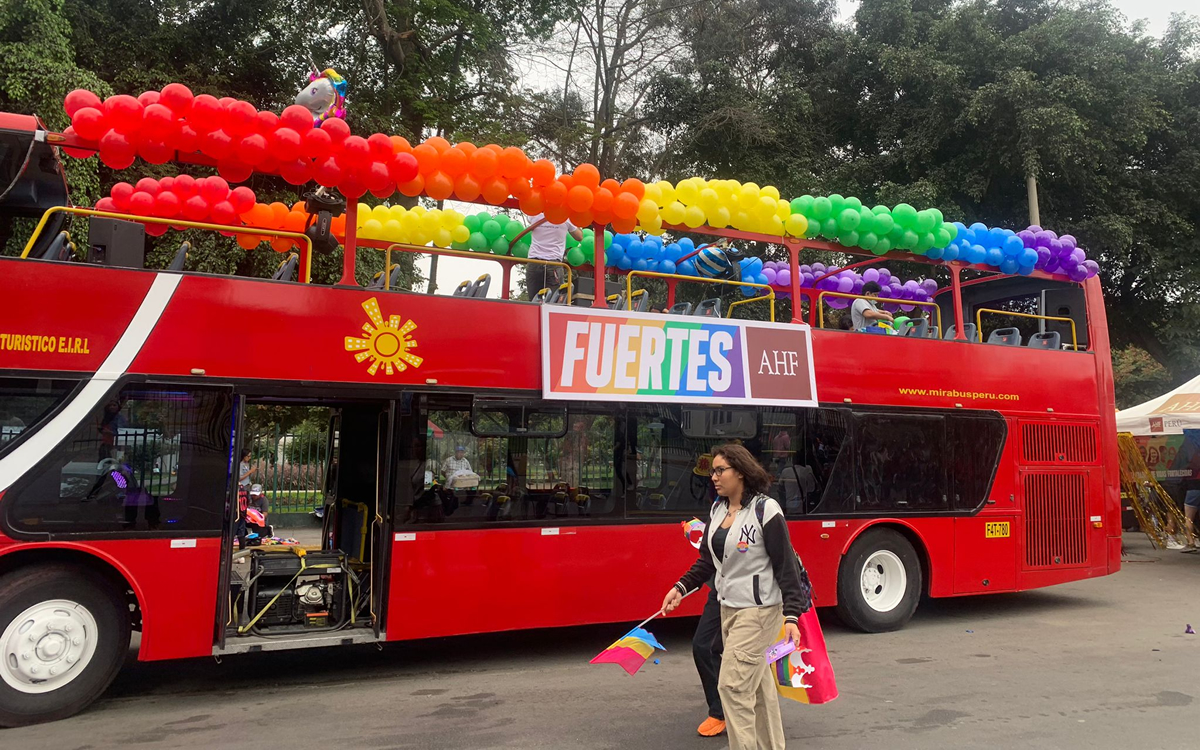
The battle for LGBTQ and intersex rights in Peru is steep.
According to a 2020 Ipsos survey, only 38 percent of Peruvians were in support of civil unions for same-sex couples — seven percentage points higher than a similar survey in 2014, but still nowhere close to a majority of the country.
A 2023 survey from Ipsos revealed that 98 percent of LGBTQ and intersex people surveyed were either “extremely” or “very” dissatisfied with “the role of the State in guaranteeing rights of diverse families/LGBTIQA+ people.” Fifty-six percent of respondents reported having experienced discrimination.
“We will never lose hope,” says Apolaya. “Even with this Congress, as part of civil society and as part of the social fabric of this country, we will continue demanding that the minimum of democracy that we have persists and that we do not lose it.”
Another prominent group of attendees at the march is one that has been steadily increasing in Peru over the last few years: Venezuelan immigrants. According to the U.S. Agency for International Development, Peru is the second-largest recipient of Venezuelans and the largest host country of Venezuelan asylum seekers worldwide. Peru hosts more than one million Venezuelans, with most of them living in the capital.
Therefore, many LGBTQ and intersex Venezuelans joined Lima’s Pride parade. One of those Venezuelans was Mariangel Rodriguez. Despite living in Lima for nine years, Rodriguez hasn’t always felt comfortable in LGBTQ and intersex spaces in Peru.
“I think part of my concern about not participating in the previous marches was related to the fact that I’m a minority within a minority,” said Rodriguez. “Being a woman, a migrant who comes from a very hard socio-political context … this has transformed the course of my life.”
Rodriguez went on to describe her experiences with discrimination in Peru.
“In many parts of Peru, it is widespread to see migrants as something negative,” said Rodriguez. “And well, in the past, being a Venezuelan person, obviously I have felt the need to protect and take care of myself by avoiding the marches. But generally, this march has meant something very important to me, not only because it was the first time I went, but also because I saw how many things have evolved in such a short time.”
Despite homophobia and transphobia coming from both the left and right in Peru, many activists have noticed a change in attitudes toward LGBTQ and intersex people, especially among the younger generation.
On the sidelines of the march, one mother held a sign which read: “My son has filled my life with colors.” She told the Blade that her only wish for her 18-year-old child is for him to live his life in the way he wants and for him to be happy.
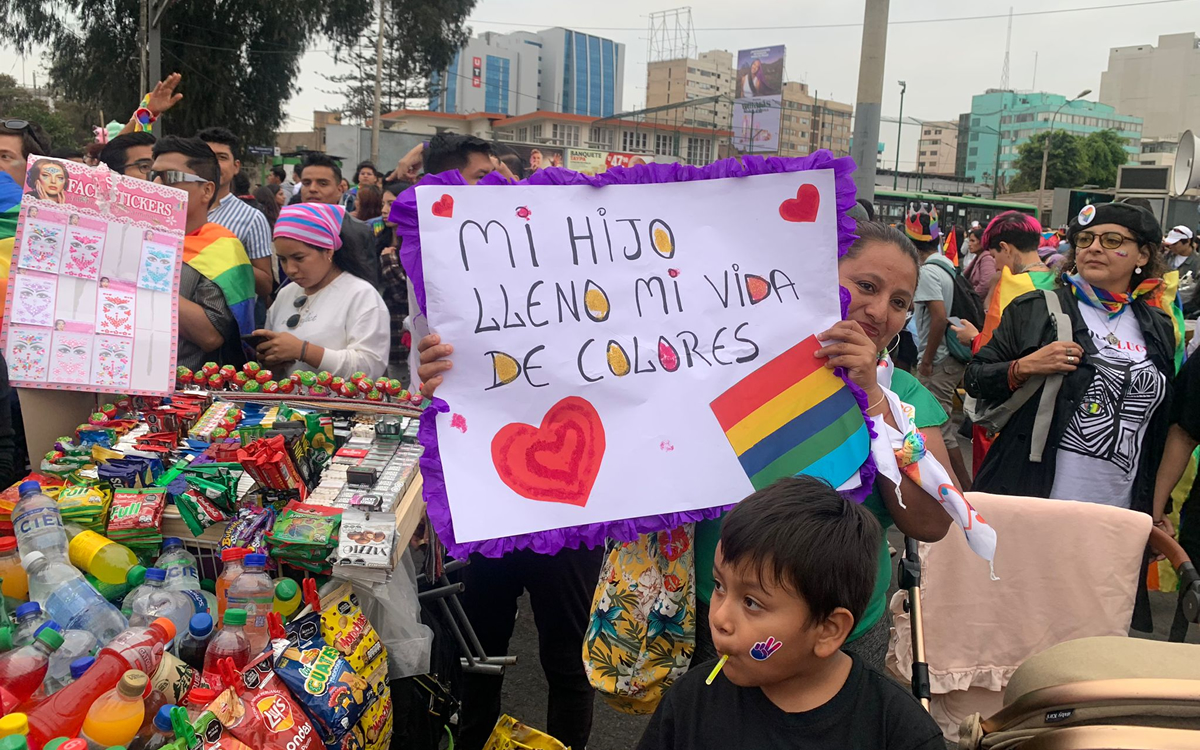
South America
Argentina government dismisses transgender public sector employees
Country’s Trans Labor Quota Law enacted in 2021

Protests have broken out across Argentina in recent weeks after the dismissal of transgender people from their government jobs.
President Javier Milei’s action is in stark contract with the progress seen in 2023, where the government’s hiring of trans people increased by 900 percent within the framework of the Trans Labor Quota Law that had been in place since 2021.
Among those affected is Sofia Diaz, a “survivor” who shared her testimony with the Washington Blade hours after she traveled from Chaco Province to Buenos Aires to protest her dismissal.
Presentes, an LGBTQ news agency, reported the government dismissed more than 85 trans employees in less than two weeks.
Diaz, 49, holds a degree in combined arts. She joined the National Social Security Administration (ANSES) in 2022 under the Trans Labor Inclusion Law. The layoffs began in January and left many people feeling uncertain and anguished. It was her turn a few days ago.
Diaz in an interview recounted how the situation became progressively more complicated, with difficulties in accessing information about her employment status and the eventual confirmation of dismissals through WhatsApp messages. This government action, according to Diaz, violates the law.
“We were on a Friday, I think on March 24, in the office and we have a WhatsApp group of other colleagues from all over Argentina who entered through the trans labor quota and they tell us if we can get our pay stubs on the intranet,” Diaz recalled. “So, I tried to enter, I could not, I talked to two other colleagues and they told me no, they could not, and so we went to another person. He couldn’t either.”
“Some people told us that it could be a system error. Well, we were never calm, let’s say not how this issue of installing fear and the perversion with which they do it ends,” she added. “This sadism of … inflicting pain and speculating with your misfortune and so on … is something that characterizes Javier Milei’s government.”
Diaz recalled a list of those dismissed from the agency began to circulate from the union in the afternoon. A colleague passed it on to her, “and well, unfortunately I was also on that list.”
“At that moment the whole weekend went by with anguish, crying, and talking with other colleagues from other places, not only trans, but everyone, everyone and everyone,” she said. “On Monday when we went to try to enter, we could not enter with the biometric, which is the thumb we had to use every morning to enter.”
Despite the difficult moment through which she is going, the trans activist stressed to the Blade that she will continue protesting and will even sue the government because her dismissal is illegal and “violates the constitution itself.”
The LGBTQ community and its allies have mobilized and organized demonstrations, highlighting the importance of defending the rights won and fighting against discrimination and exclusion. Diaz emphasized the fight is not only for the people affected today, but also for future generations, saying the historical memory of the struggles for inclusion and social justice must be kept alive.
“The Argentine government thus faces a key challenge in human and labor rights, where public pressure and social mobilization can play a determining role in protecting the rights of LGBTQ+ people,” Diaz said.
South America
Daniel Zamudio murderer’s parole request denied
Raúl López Fuentes convicted of murdering gay man in Chilean capital in 2012
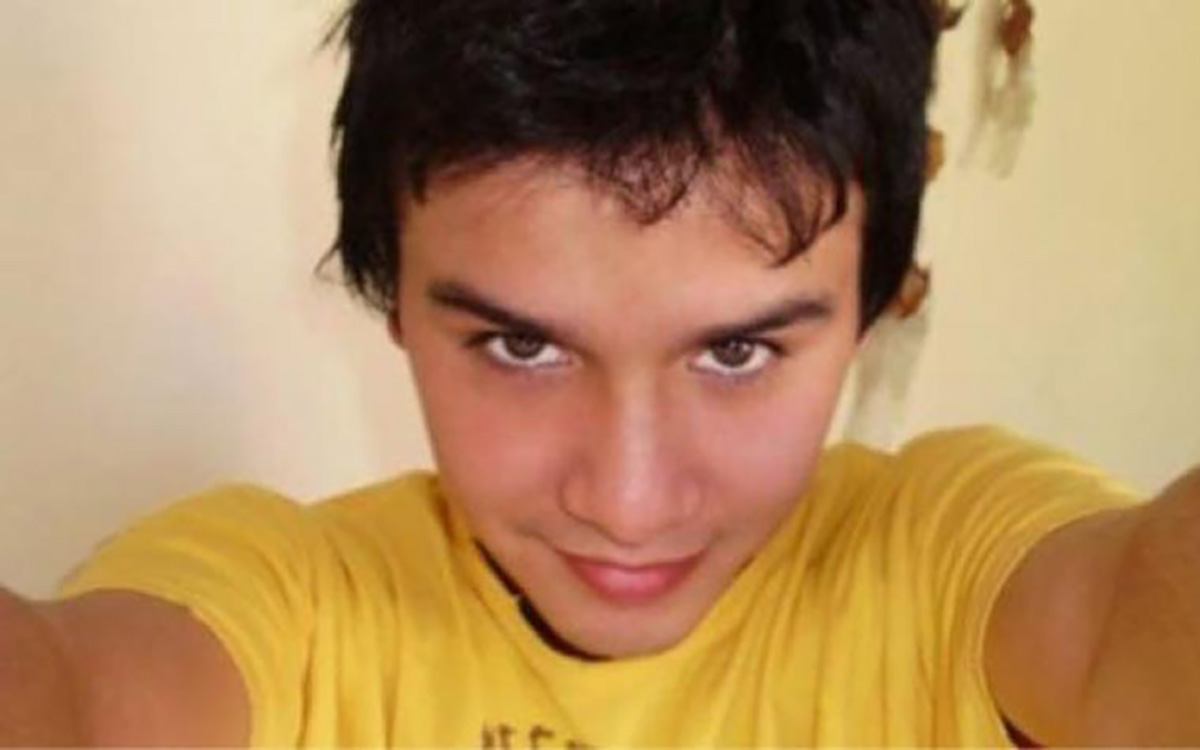
Chile’s Parole Commission on Tuesday rejected a request to allow one of the four men convicted of murdering Daniel Zamudio in 2012 to serve the remainder of his sentence outside of prison.
Raúl López Fuentes earlier this month asked the commission to release him on parole. Zamudio’s family and members of the Movement for Homosexual Integration and Liberation, a Chilean LGBTQ rights group, had gone to court to block the request.
Among the arguments put forward that influenced the commission’s decision is what Movilh categorized as his “high risk of recidivism, linked to the adherence of an antisocial behavior with a tendency to minimize his acts transgressing social norms.”
The commission pointed out that López has psychopathic traits because he is aware of the damage he did to Zamudio and his family.
“In addition, he maintains a high risk of violence, not being advisable to grant the benefit,” the report said.
Zamudio was a young Chilean man who became a symbol of the fight against homophobic violence in his country and around the world after López and three other young men with alleged ties to a neo-Nazi group beat him for several hours in Santiago’s San Borja Park on March 2, 2012. Zamudio succumbed to his injuries a few weeks later.
The attack sparked widespread outage in Chile and prompted a debate over homophobia in the country that highlighted the absence of an anti-discrimination law. Lawmakers in the months after Zamudio’s murder passed a law that bears Zamudio’s name.
López in 2013 received a 15-year prison sentence after he was convicted of killing Zamudio. Patricio Ahumada received a life sentence, while Alejandro Angulo Tapia is serving 15 years in prison. Fabían Mora Mora received a 7-year prison sentence.
Zamudio’s mother, Jacqueline Vera, exclusively told the Washington Blade after the commission rejected López’s request that “we as a family are calmer.”
“Even with my husband we were in a lot of pain at the beginning. It was like a blow of very strong emotions, so we tried to stay calm because we still had to solve the problem,” Vera said. “We had four days to solve it.”
López will have to serve the remaining three years of his sentence before his release.
“I will continue working to improve the Zamudio Law and so that this murderer does not leave prison because he is a danger to society, he does not represent repentance and people like this cannot be free,” she said. “For the same reason, we have to work so that hate crimes have life imprisonment and that is what we will concentrate on.”
South America
Man convicted of killing Daniel Zamudio in Chile seeks parole
Raúl López Fuentes in 2013 sentenced to 15 years in prison

One of the four men convicted of murdering a young gay man in the Chilean capital in 2012 is seeking parole.
Raúl López Fuentes in 2013 received a 15-year prison sentence after he was convicted of killing Daniel Zamudio.
Zamudio was a young Chilean man who became a symbol of the fight against homophobic violence in his country and around the world after López and three other young men with alleged ties to a neo-Nazi group beat him for several hours in Santiago’s San Borja Park on March 2, 2012. Zamudio succumbed to his injuries a few weeks later.
The attack sparked widespread outage in Chile and prompted a debate over homophobia in the country that highlighted the absence of an anti-discrimination law. Lawmakers in the months after Zamudio’s murder passed a law that bears Zamudio’s name.
Patricio Ahumada received a life sentence, while López and Alejandro Angulo Tapia are serving 15 years in prison. Fabían Mora Mora received a 7-year prison sentence.
López has asked the Seventh Santiago Guarantee Court to serve the last three years of his sentence on parole. Zamudio’s family and Jaime Silva, their lawyer who works with the Movement for Homosexual Integration and Liberation, oppose the request.
Movilh represented Zamudio’s family after his murder.
Zamudio’s mother, Jacqueline Vera, during an exclusive interview with the Washington Blade said López’s petition “provoked all the anguish, all the commotion of his time.”
“It was very cruel because in fact two days before we were at Daniel’s grave, where it was 12 years since his death and the beating,” said Vera. “He really does not deserve it.”
“We have gone through very difficult moments,” she added.
The mother, who later created a foundation to eradicate discrimination in Chile, was emphatic in indicating that she and her family “do not accept the release of this guy because he is a danger to society and a danger to ourselves.”
“At the last hearing where they were sentenced, they told us that we are going to remember them when they get out,” said Vera. “They threatened us with death. There is a video circulating on social networks where they were in front of me and they laughed and made fun of me. They told me that I remembered that I had three more children.”
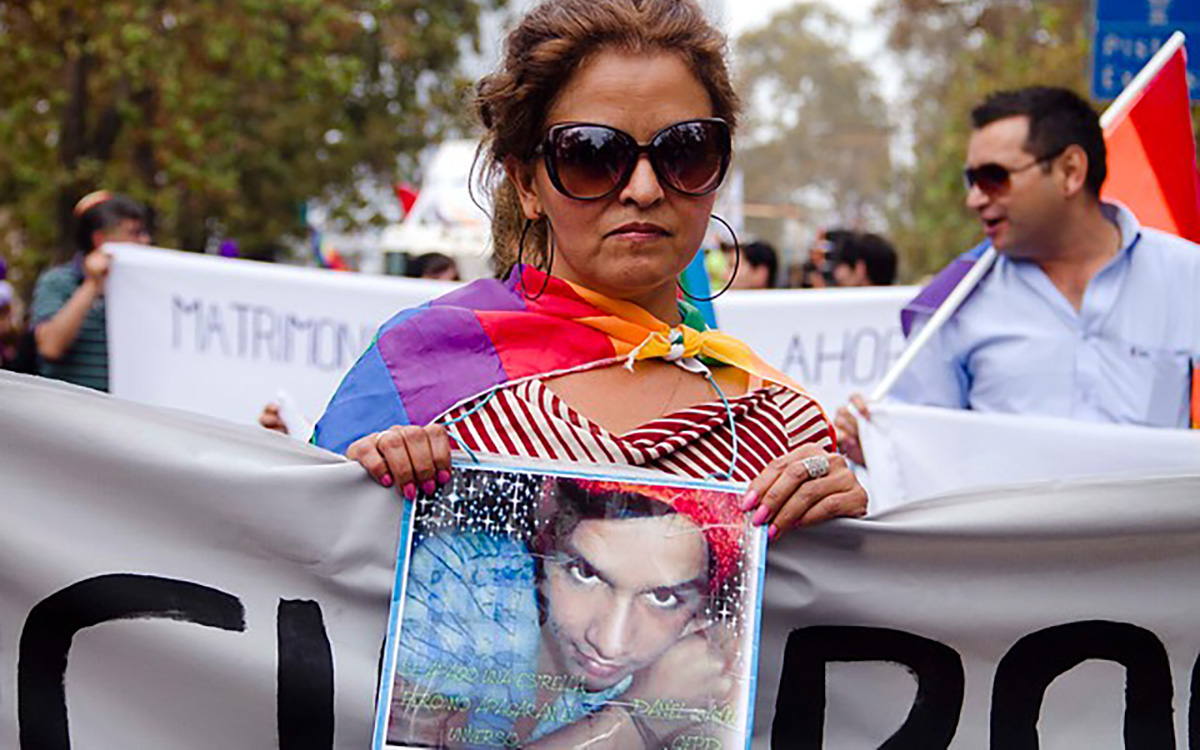
Regarding the possibility that the Chilean justice system will allow López to serve the remaining three years of his sentence on parole, Vera said “with the benefits here in Chile, which is like a revolving door where murderers come and go, it can happen.”
“In any case, I don’t pretend, I don’t accept and I don’t want (López) to get out, I don’t want (López) to get out there,” she said. “We are fighting for him not to get out there because I don’t want him to get out there. And for me it is not like that, they have to serve the sentence as it stands.”
LGBTQ Chileans have secured additional rights since the Zamudio Law took effect. These include marriage equality and protections for transgender people. Advocacy groups, however, maintain lawmakers should improve the Zamudio Law.
“We are advocating for it to be a firmer law, with more strength and more condemnation,” said Vera.
When asked by the Washington Blade about what she would like to see improved, she indicated “the law should be for all these criminals with life imprisonment.”
-

 District of Columbia4 days ago
District of Columbia4 days agoCatching up with the asexuals and aromantics of D.C.
-

 South America4 days ago
South America4 days agoArgentina government dismisses transgender public sector employees
-

 Maine5 days ago
Maine5 days agoMaine governor signs transgender, abortion sanctuary bill into law
-

 Mexico3 days ago
Mexico3 days agoMexican Senate approves bill to ban conversion therapy



